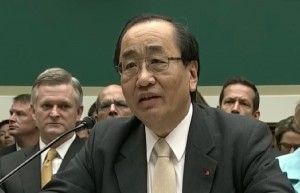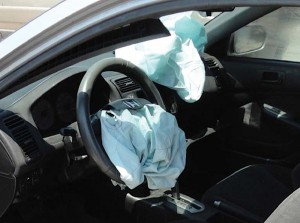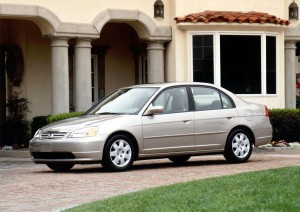A 17-year-old girl driving a car near Houston was killed when the airbag in her 2002 Honda Civic malfunctioned during a crash, the latest in a series of 11 deaths now linked to faulty airbag inflators provided by Japanese supplier Takata.
The defect, which has also been linked to more than 100 injuries, has triggered the largest recall in U.S. automotive history, 14 automakers now calling back 24 million vehicles to replace Takata inflators. There has been growing pressure to expand that recall to cover millions more vehicles considered potentially at risk.
The Richmond, Texas girl’s vehicle had already been subject to recall, though repairs had been made. That is likely to escalate pressure on both Takata and the carmakers that have used its airbag systems to increase efforts to reach owners of the affected vehicles. Federal data show that only about 27% of the vehicles covered by the Takata recall have so far been fixed.
The accident occurred when the young woman’s 2002 Honda Civic rear-ended another vehicle, triggering its airbags. The crash was considered “moderate,” Sheriff’s Deputy Danny Beckworth told the Associated Press, and likely not life-threatening. “Everybody would have walked away,” the Deputy said.
But due to a malfunction, the airbags apparently over-inflated, sending shrapnel into the passenger compartment. She died due to wounds to her neck.
Similar reports have been issued in the previous 10 deaths, all but one of which occurred in the United States. All but one of the fatal injuries occurred in Honda vehicles, that Japanese automaker being Takata’s largest customer until recently.
(Takata officials lied to conceal airbag problem, Senate panel finds. For more, Click Here.)
The precise cause of the problem had long been subject to debate. Initially, it was linked to a manufacturing problem at two North American factories, and was believed to only occur when vehicles were operated in areas with high humidity, such as Southern Florida. But recent Takata failures have occurred in other parts of the country.
A research team, funded by a consortium of automakers using Takata equipment, last month announced preliminary findings that added a more worrisome factor to the list of things that could cause an airbag to malfunction: the basic chemical used in its inflator. Takata has long relied on explosive ammonium nitrate, but it now appears that this compound can break down over time, making it more prone to misfiring.
That has led some safety advocates to call for the recall of all vehicles using Takata inflators. That would be about 287.5 million of the devices. Because most vehicles use multiple airbags, the precise number of cars, trucks and crossovers that would be affected is not yet clear, but would almost certainly top 100 million, according to industry experts.
Recent reports, including coverage on TheDetroitBureau.com, have estimated the financial impact could rise to as much as $24 billion for the already struggling Takata. That has raised concerns that the supplier might not be able to survive.
How the cost of such a recall would be divided up among Takata and the 14 automakers using its airbags is not certain, but those manufacturers are facing additional pressure from the National Highway Traffic Safety Administration to speed up repairs on recalled vehicles.
(For more on the potential financial impact of an expanded recall, Click Here.)
According to the National Highway Traffic Safety Administration, only 7.5 million of the 28.8 million inflators – used in 24 million vehicles – have so far been replaced, about 27% in total. That is well below the average rate of repair for recalls, especially for major safety problems, though even the most critical defects typically see a response rate of less than 75%.

Takata's Hiroshi Shimizu testifying before Congress last year. The supplier is facing increasingly financial problems due to the recall.
The 2002 Honda Civic involved in the fatal Texas crash was subject to six recall notices since 2011, but repairs were not completed, according to investigators. Part of the problem was that the vehicle had gone through multiple owners, an issue that has stymied automakers trying to make repairs to older vehicles. General Motors ran into similar problems when it recalled 2.4 million vehicles due to a defective and potentially deadly ignition switch in 2014.
NHTSA chief Mark Rosekind has told automotive industry officials that the agency wants to reach a point where all recalled vehicles are fixed, though he also acknowledged that may prove extremely difficult.
Efforts to force repairs have been slow to move through state and federal channels. Congress did recently approve a long-stalled effort forcing rental car companies to pull recalled vehicles out of their fleets until repairs could be completed. But calls for a measure that would require owners to fix vehicles before they could be registered have not yet when the necessary support.
(How can NHTSA improve the recall response rate? Click Here for the story.)


